Kevin Clarke
Operetta Research Center
7 September, 2016
Jeff Clarke has been the Artistic Director of UK’s Opera della Luna since 1994. With that company, he has made six Offenbach production, the last being a double-bill of two less familiar one-acters. They turned out to be a critical success, bringing new (sexual) energy to the British operetta scene and attracting a decidedly younger audience. We chatted with Jeff about working on these latest Offenbach offerings, and what makes these shows so revolutionary, even today.

Opera della Luna’s artistic director Jeff Clarke. (Photo: www.jeffclarkeopera.com)
You have recently presented a new production of two Offenbach one-act operettas, as a follow-up to the grander Orpheus in the Underworld. What makes it interesting to do one act pieces by Offenbach, and why are they so rarely performed these days?
Rarely do we go to a restaurant and order only one course – at least in UK, we usually expect to order a “starter” and/or a desert and maybe a cheese course and coffee. As a child, when I went to the cinema, as well as the main film there was always a supporting feature, and possibly a cartoon. So was an evening at the theatre in the 19th century; one went for a long packed evening and expected a curtain-raiser; the “main feature”; and probably an after-piece. The rocketing costs of presenting theatre productions, as well as a greatly changed availability of leisure time, have meant that we only ever present the main course; it is more than enough to satisfy our epicurean appetites. Thus the legion of short pieces that used to contribute to a long evening’s program are rarely required or heard.
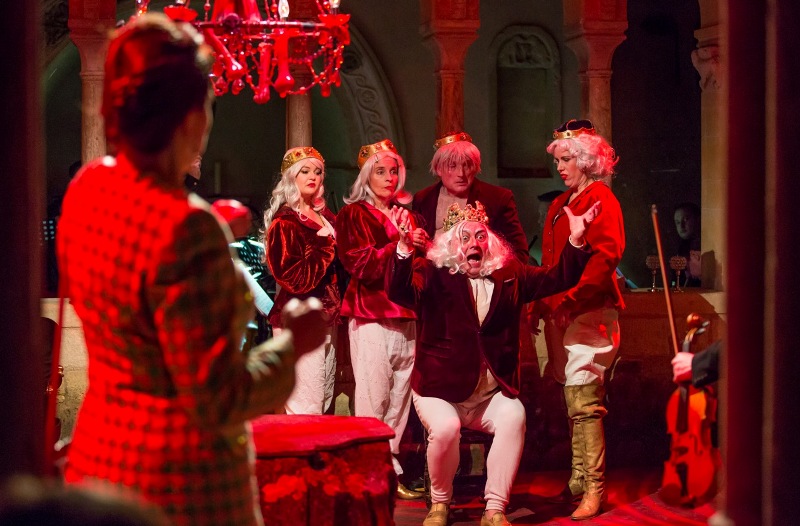
Opera della Luna’s “Orpheus in the Underword” 2015. (Photo: OdL)
As opera promoters we are taught the dictum that double bills do notoriously bad business. Cav and Pag appears the only one you can get away with, and even so, its returns will never match those of a Bohème or a Traviata. And yet, there is a refreshing dynamic in performing two pieces whose stories can each be told within an hour. There are admittedly limitations to the emotional thrust of the piece, and we are so conditioned to following the development of a plot over a period of two hours or so, with a suitable break half way through. A double bill is a different experience; and the more contrasting the two productions are, the better.
From the company’s point of view it is a splendid opportunity to show the versatility of our performers and the breadth of the company’s style.
Though each of the shows lasts about an hour, in many ways it is like performing two full operas in one night. New sets, costumes, concepts are needed for each show, and the actors feel as though they are doing two complete shows. Interestingly, when Offenbach brought his company to London in the 1850s he presented three of these one act operettas in one evening. 19th century appetites were greater than our own!
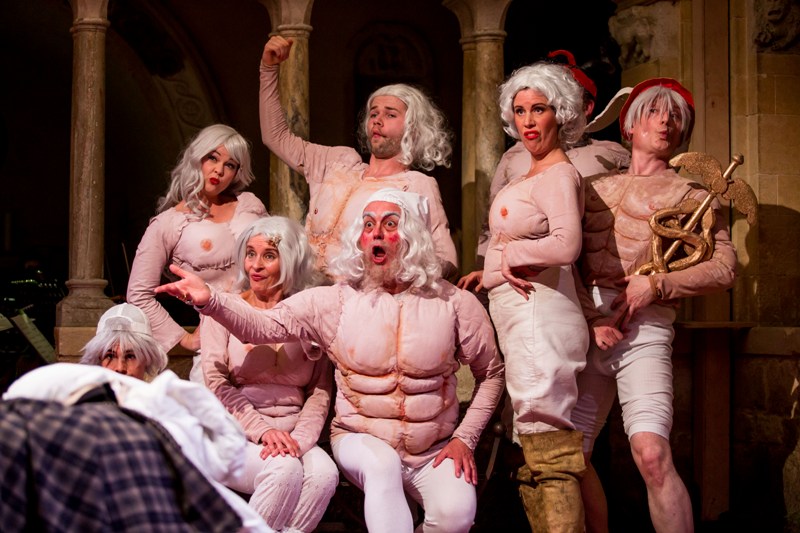
The Olympians in their travel outfits: “Orpheus in the Underworld” by Opera della Luna. (Photo: OdL)
I think one act operettas are one of the great neglected categories of our musical theater heritage. Rarely heard and yet potentially as powerful as full length pieces. I have long held a dream of starting a lunch-time opera house, performing hour long pieces in city business districts, where not every lunchtime has to be spent entertaining business clients in expensive lunch meetings. I’m probably too old to start a new major project now, but one day someone will do it.
You opted for the 1868 Isle of Tulipatan, which is a show about gender deconstruction and the possibility of same-sex marriage, only a year after Karl Heinrich Ulrichs had the world’s first official coming-out in 1867 at the German lawyer’s meeting in Munich, in front of 500 colleagues. He wanted to present the idea of legally accepting marriage for “Urninge” (gay people). All of this right before Karl Maria Kertbeny presented the term “homosexual” for the very first time in 1869 (in opposition to “heterosexual” and “monosexual.”) Did the Offenbach show strike you as particularly “modern” when you worked on it?
“Modern”….. Well, yes; in the way that it presents surprising and rather bizarre subjects, which are certainly not familiar operetta fare. Yes, in the way it tells the stories in a very ‘in your face’, uninhibited way. I am not convinced however that the authors’ attitude to the subject is particularly enlightened.
It is a piece about sexual stereotyping, rather than sexuality. Homosexuality doesn’t really come into it (except in the case of the parents’ horror at the impending union).
Hermosa and Alexis never see each other when they are both dressed as the same sex. They only ever see each other, or think of each other as the opposite sex, and as such are always totally heterosexual.

Sheet music cover for the quadrille of Offenbach’s “L’Île de Tulipatan.”
The plot is driven by Rhomboid (Romboidal) and Theodorine’s (misinformed) determination that a union between them is out of the question. What is interesting is the extent to which the two young people cope (or not) with their unconventional patterns of behavior.
One of the biggest laughs in the show is when Hermosa, having discovered that “she” is a man, exclaims: “This explains why I have always lacked daintiness, and why I have a peculiar love of artillery.”
I was very worried about an aspect of this when we were working on the show.
I didn’t want to reinforce prejudice and sexual stereotyping by presenting the idea that all was resolved and ‘as it should be’ when the two young people swap identities, and the artillery-loving girl becomes a man, and the caring, over-sensitive boy becomes a woman.
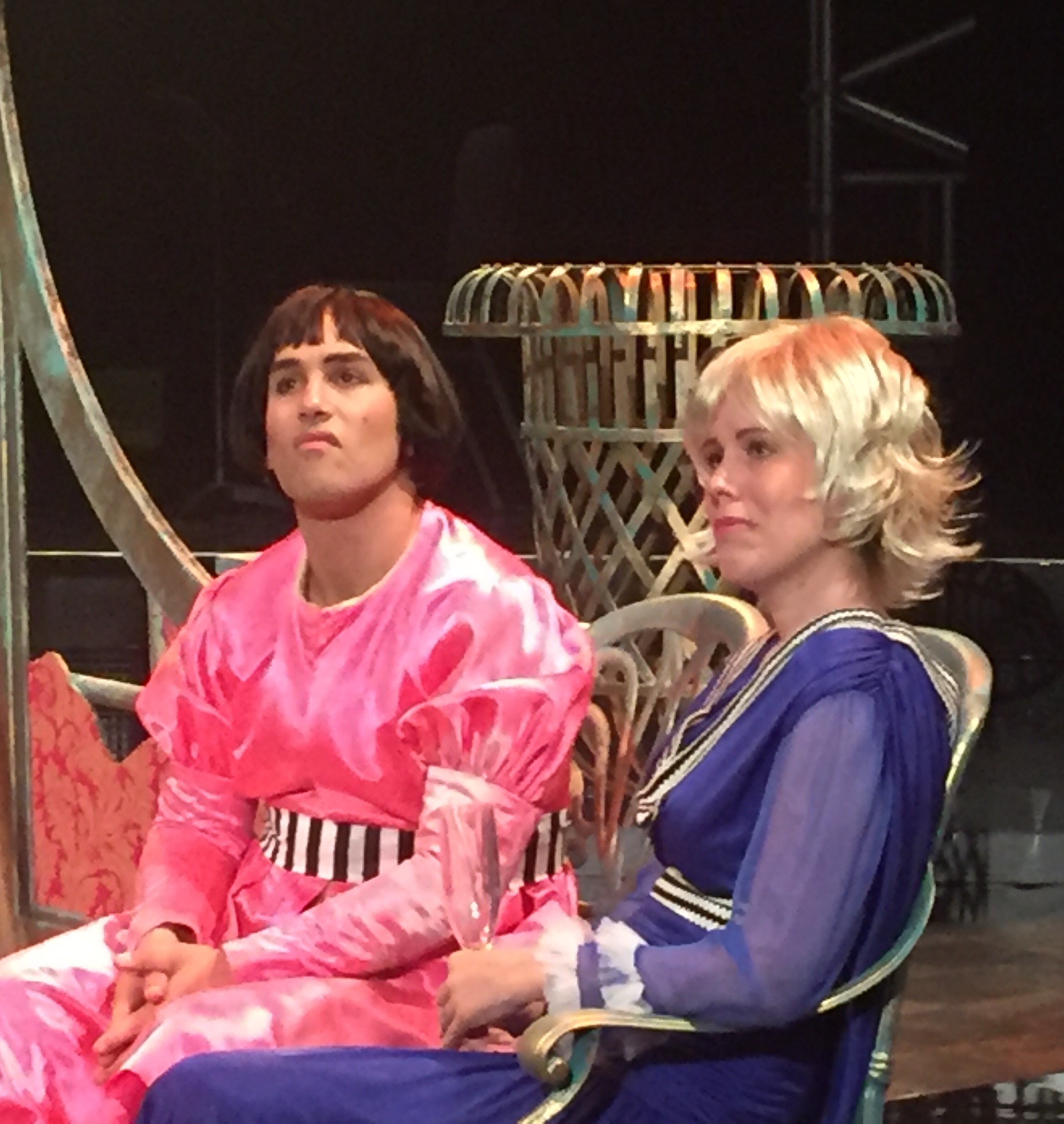
Hermosa and Theorderine in “The Isle of Tulipatan” in 2016. (Photo: Opera della Luna)
Our way of at least countering this was allowing the characters to retain one or two favorite items from their former gender identities. Thus, when Hermosa, having discovered “she” is a man, appears in uniform, she still has her handbag and her pink high-heel shoes because “she” has become so attached to them. Alexis similarly retains his/her stout walking boots, and we had tried to use a walking cane as a similar sign of his initial male identity. Unfortunately the cane proved too difficult to work with in the dances and the staging, so it had to go.
There is no doubt however that the original plot resolves itself by the effeminate boy discovering he is really a girl, and the “butch” girl discovering she is really a boy.
I don’t regard that as a modern attitude. In the very early days of working on the shows, before I had cast it, I toyed with the idea of casting against the original and casting a male actor to play Alexis and a female to play Hermosa. I decided it was possibly one risk too many, with a show that was far from being a sure fire hit. It would, however, be an interesting thing to do.
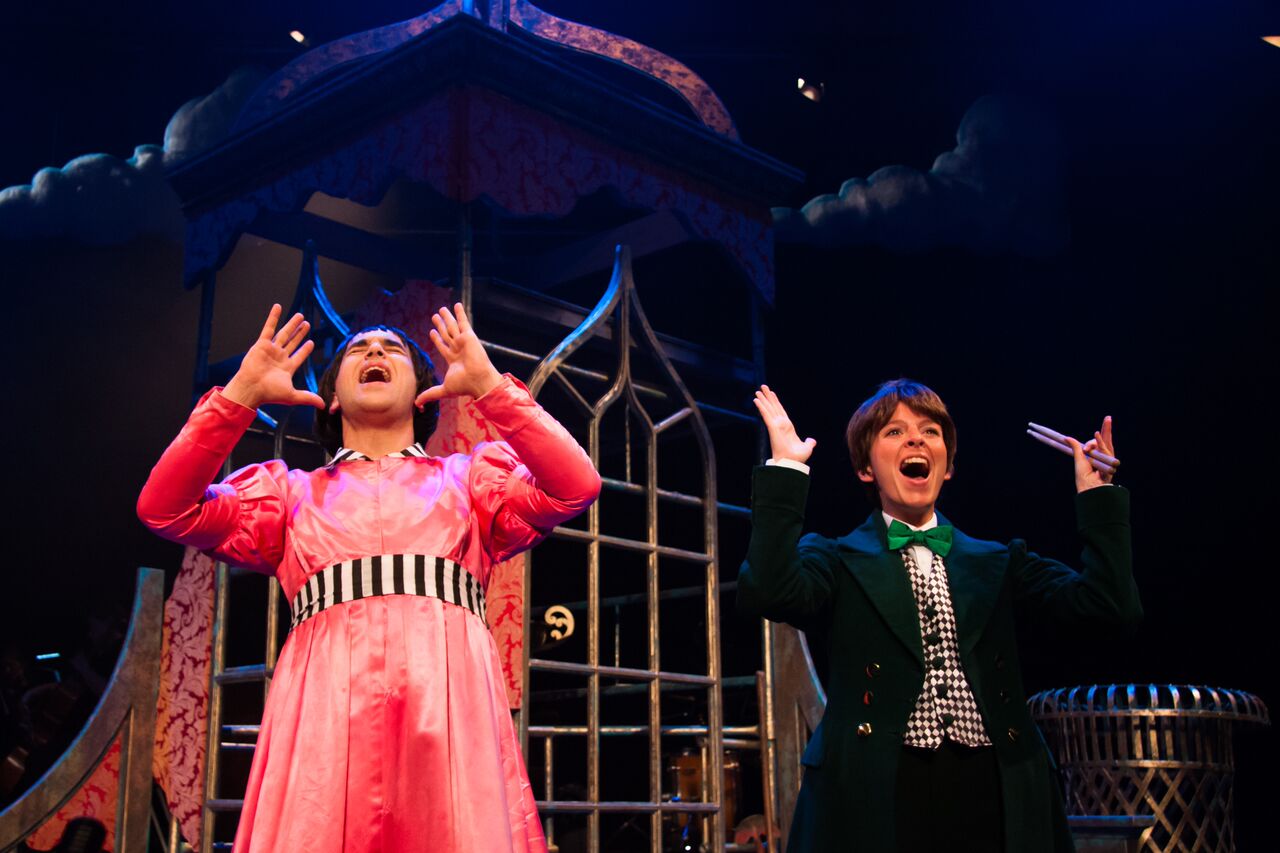
The two cross-dressed and cross-gender heroes in Offenbach’s “The Isle of Tulipatan” in 2016. (Photo: Opera della Luna)
Considering that the trans* movement with all its political demands is in the news almost daily now, and considering the intense gender discussions going on since the 1970s, it’s somewhat surprising that few people have included Tulipatan as an early example of how these topics were dealt with. What’s your opinion on such “neglect” to see Offenbach and operetta as forerunners to the Sexual Revolution, Feminism and the same sex marriage debate?
Well, as I said in my response to the previous question, I am not sure how revolutionary the piece is in terms of confronting same-sex relations; but yes, it certainly raises questions about Feminism and patterns of sexual behavior, which at least provoke thought, even if it stops short of offering revolutionary answers. I think it is more astonishing from the point of view of looking at a history of music-theatre in general that these little pieces should concern themselves with such surprising aspects in the mid 19th century.
Two years ago, we performed a modern dress (well 1950s) version of La Fille du Rgiment, set amongst the biker gangs of California. What interested me hugely about that show was that, again, it was about sexual stereotyping. There are various examples of “strong” women in a number of operas. Soft-hearted men tend to be rarer.
Let us not forget of course that Shakespeare dealt with these same issues more than once, but particularly in As You Like It, and Twelfth Night.

The father trying to convince his daughter that “she” cannot possibly marry another woman, in “The Isle of Tulipatan.” (Photo: Opera della Luna)
How did your cast react to the gender bending moments in Tulipatan?
They relished their roles. It was so refreshing for them to address a role that was completely different to anything they had done before. I think Caroline (Alexis) may have played Cherubino or some other trouser role before, but Anthony (Hermosa) had never played a woman. Of course any short comings he had in creating a female sensitivity were completely appropriate. I think all the cast found both operas extraordinary.
Our rehearsal days were packed not only with gales of hilarious laughter but with a reinforced joy and amazement at how unusual these pieces were, and unlike any other operatic fare.
What are the challenges of performing (singing/acting) a show like Tulipatan today? Can regular opera singers do it, or do you need special musical comedy people?
You definitely need singers who are as adept at acting as singing. And even more importantly, adept at comedy. That is a very special skill which many classically trained singers do not have. It is our greatest strength as a company, and (sadly) such a rare consideration today. Time and again the large public-funded companies attempt operetta without casting it with people who can deliver the lines. Offenbach, like Gilbert & Sullivan, wrote for actors who sing, and those skills, once so abundant, are becoming rarer. Today, young singers who opt for a musical theatre career rather than an operatic one, are not trained to sing acoustically, and even when they have naturally powerful voices, one has to spend considerable time instilling and passing on skills of how to project the voice, and how to avoid singing upstage the way they can when they are wearing a microphone.
I am very glad that this skill, which I feel it is so important to preserve, is at least noted by the reviews we are now receiving in the national press. All five of the cast of the double bill were cast as much for their acting abilities as their vocal skill, possibly more so. And I am very fortunate to have a conductor in Toby Purser who fully understands that requirement and does not push me to take the best voice that comes into the audition room. I hope it’s not immodest to quote The Spectator’s review: “The cast struck me as precisely the sort of versatile repertory team Offenbach must have had in mind — five singers with light, attractive voices that can deliver full-scale operatic power when required.
Crucially (and this is where operetta productions usually fall down), they’re also terrific in the spoken dialogue, romping all over Clarke’s bright and witty translation.”
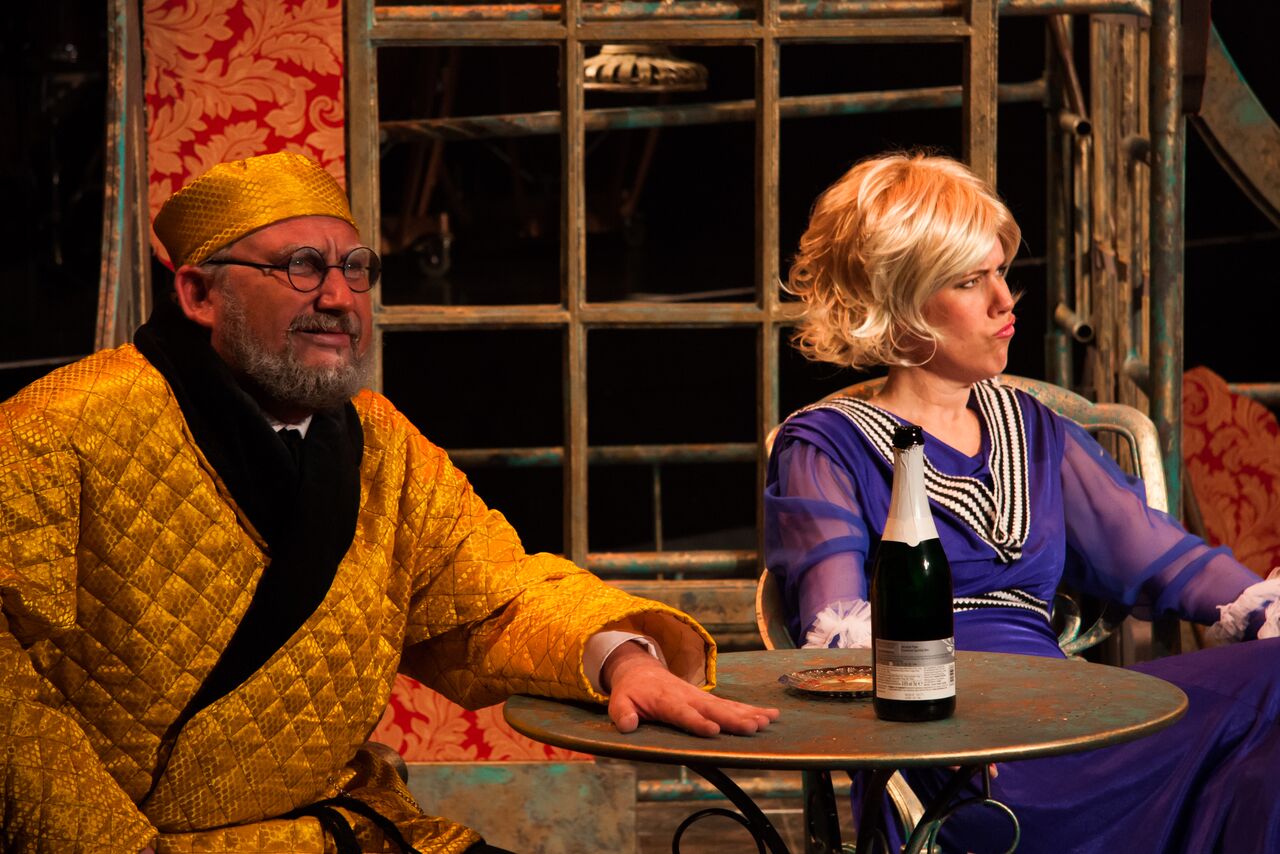
The worried parents in “The Isle of Tulipatan,” scared their daughter might enter into a same-sex marriage. (Photo: Opera della Luna)
To find “precisely the sort of versatile singers” is not easy. It’s something we spend a long time looking for; something I am passionately insistent about it; and something which appears to be paying dividends.
There is no English language recording of Tulipatan. Are you going to issue one, based on your production?
We would love to. We have never issued a studio recording of any of our productions, though there are DVDs of various live performances. I suspect studio recordings are expensive, but I would love to do it. I suspect it’s something we will need to raise funds to subsidize, and usually I am far more concerned with financing the next production. However it would be something worth exploring.
Did you use the original English version performed in 1872 at the Theatre Royal in Leeds, where the show was titled King Kokatoo, or Who is who and which is which?
I didn’t know of the existence of that piece. No, I made my own new translations from the French originals – as I have with all OdL’s previous productions (except The Merry Widow). I think my translation was very faithful to the spirit and meaning of the original, but I do think the freedom to use modern language and more importantly, express the ideas with a modern sense of humor contributes in no small way to the success.
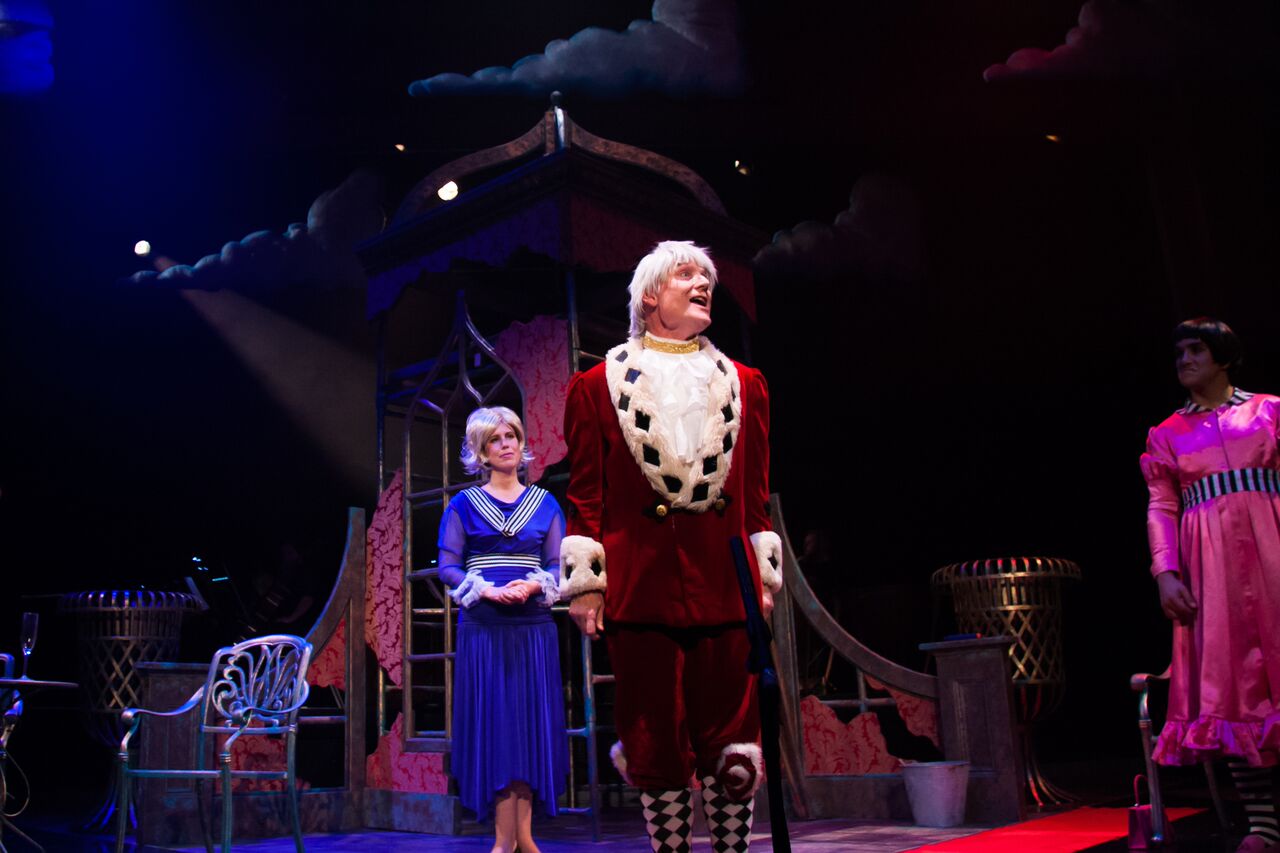
The carzed king in Offenbach’s “The Isle of Tulipatan” in 2016. (Photo: Opera della Luna)
Apart from the gender and gay issues, the show is also about a crazy king and his bizarre relationship to the media. Is that equally modern, in the way Henri Chivot and Alfred Duru treat the topic in their libretto, when you think of presidential candidates such as Donald Trump?
There is a theory that Cacatois’ complaint against the press in the “canard” number was in fact an opportunity for Offenbach to let off steam about his own struggles with the press and the erroneous reports of his financial problems. Whether this is true or not, Cacatois must be speaking for a good many monarchs and politicians when he complains about his mistreatment by the press. I don’t know how the 1872 version you mention dealt with the play on words in the “Canard” number, but the only other English version I have found side-stepped the pun completely. The only way I felt I could make the quacking chorus work, and make sense of it all, was to have Cacatois explain to the audience how it worked in French – and then proceed to perform the number. I had thought I might be ‘hauled over the coals’ for this, and criticized for having failed to translate it; but I wasn’t. From the beginning we established a convention that occasionally the actors came out of character and addressed the audience directly. That no doubt helped to make “Canard” work.
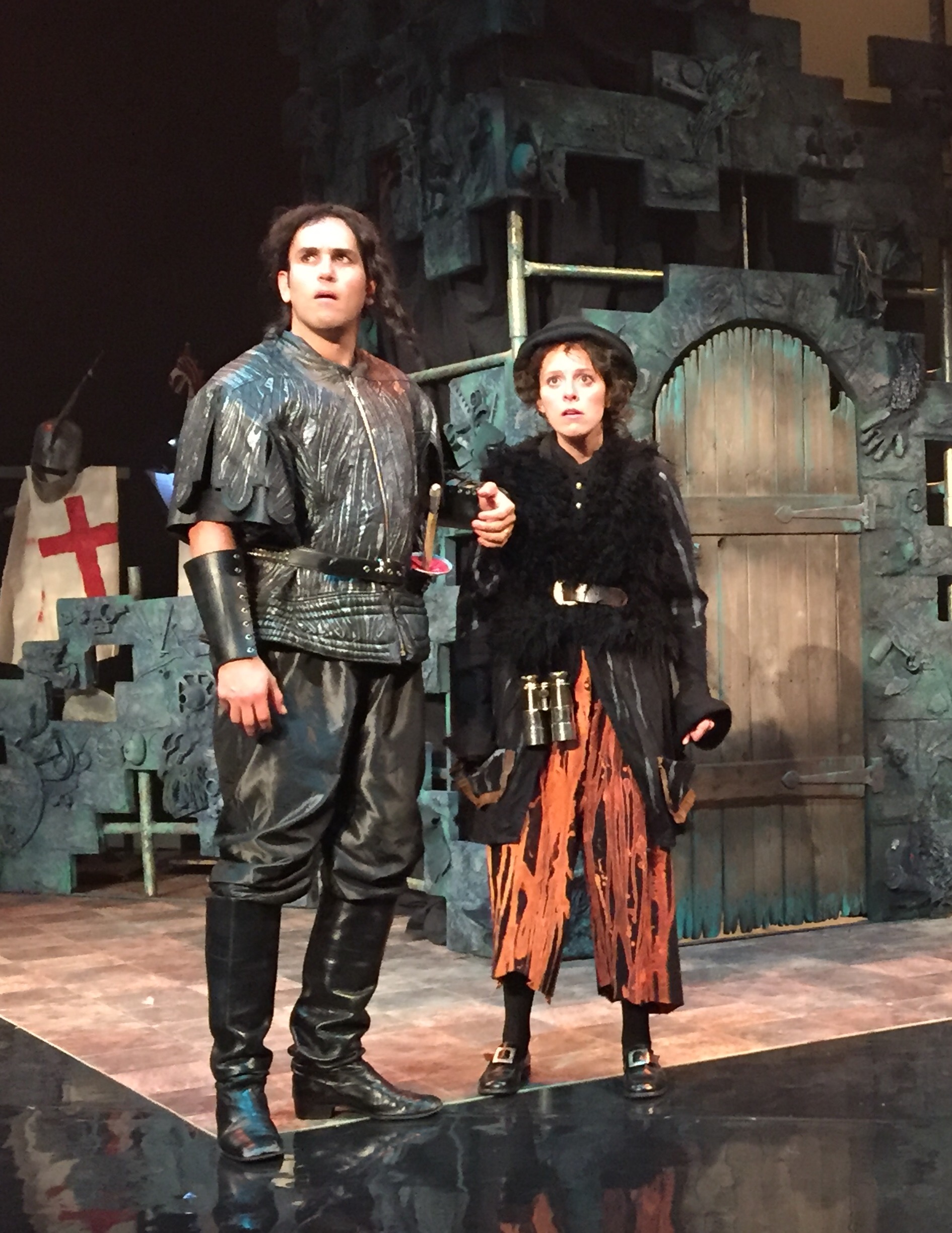
Scene from the 2016 production of “Croquefer, ou le dernier des Paladins.” (Photo: Opera della Luna)
Your second show in thedouble-bill was the early Croquefer, ou le dernier des Paladins, first performed in 1857 at theThéâtre des Bouffes-Parisiens. It’s a totally mad farce about Christian crusaders, and it’s an orgy of violence. Does it foreshadow Quentin Tarantino?
I may be wrong but I don’t think Tarantino was playing it for laughs….. I do think it foreshadows Monty Python and Blackadder. The character of the determined pugilist who is determined to fight despite having lost most of his body parts is pure Spamalot. I loved the fact that it is anti-militarist, and clearly exposes the futility of warfare. But what I loved more is the daring of Offenbach and his librettists in creating a brilliant quintet all about collective diarrhea, complete with flatulent brass farts and searingly painful bass string glissandi.
It is a masterpiece of comic writing, and I hope it does not suggest a scatological fascination to confess that it was my favorite musical number of the whole show.
Croquefer is definitely anti-realistic. In a way the show deconstructs itself, like the main characters take each other apart, piece by piece. Isn’t that something very close to our current post-post-modern ideals, also with regard to re-sampling and re-mixing?
It is certainly an extraordinary piece of writing, and felt challengingly modern to work on.
Most refreshingly, it did not demand or ever require conventional clichés of operetta style.
How did you perform these bloody disembodiment orgies from Croquefer? Certainly the show is not about singing beautifully….. it’s about action and a kind of Monty Python humor? Are the British particularly good at that?
Well, as I have already said it clearly foreshadows Monty Python, but it never occurred to me that its humor is peculiarly British. Isn’t it as much Rabelais, as Blackadder? And yes, there is a deal of guttural and spirited descriptive music in the score, but there is a huge wonderful duet for Headstrong (Ramasse-ta-tête) and Peasblossom (Fleur-du-Souffle) at the centre of the piece. It both satirizes operatic writing and matches it in intensity and vocal demands. And it is not to be tackled lightly by singers unequal to the task!
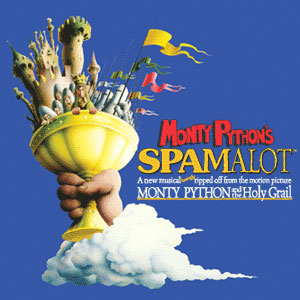
Original Broadway windowcard for the musical version of “Spamalot,” 2005.
Does Croquefer attract the same (young) audience as Spamalot?
I was delighted to see so many young people in the audience at Wilton’s Music Hall (the wonderfully atmospheric venue for our London performances). I don’t think they came expecting another Spamalot. In fact, I have no idea what they expected, but thankfully it didn’t seem to put them off. What I think appeals most to a younger audience about the way we perform these works is that it is free of all the clichés, and the requirement to be tasteful and “respectable” – which is an attitude that has marred so many terrible productions of operetta in Britain. There is an audience in Britain, which I suspect is dying off, who want operetta to be safe, pretty, tuneful, and very middle class.
Most operetta, (if it is not about diarrhea or misattributed gender), is about sex, and the British don’t like that very much. Or they didn’t. That’s why they love their Gilbert & Sullivan – because sex is never mentioned.
But how many operettas are about (at least intended) adultery? Hundreds.
Fortunately, we may be at last growing up; and to win younger audiences to a style of music they had thought was not for them is a huge achievement. Let’s hope we can just stop the big companies perpetuating the old champagne and frilly frocks approach.

“You’re an old bastard”: Scene from the 2016 production of “Croquefer, ou le dernier des Paladins.” (Photo: Opera della Luna)
Again, there is no English language recording of Croquefer. Any chance that there will be a DVD of your production?
Well, I shouldn’t admit it, but there is a DVD. We have not decided to release it publically yet. It was filmed primarily for archive purposes and as an aide, should we revive the show. However it is a six-camera shoot and not half bad. You can see a trailer from it on our website.
After these Offenbach outings: what’s next to look forward to?
Believe it or not, this show is our sixth Offenbach production. I can’t think of any other British company that can equal that record – at least in the last twenty years. But it is time to look elsewhere. I honestly don’t know at this stage what we will do next; it depends on so many other factors, not least finance and whether we go into co-production with a festival as we have with so many of our past productions. Next year I have two pressing targets: firstly to tour La Fille de Régiment, and secondly to bring our Orphée aux Enfers to London.

Scene from the 2016 production of “Croquefer, ou le dernier des Paladins.” (Photo: Opera della Luna)
If I could wave a magic wand and do what I would like to, I would do Das Spitzentuch der Königin next, as I love the score and can’t believe that we should really accept Fledermaus as the only Johann Strauss operetta worth hearing. Zigeunerbaron and Ein Nacht in Venedig are virtually never performed in the UK. That’s what I would like to do; but I am going to have to do a lot of fund-raising and arm-twisting first.
To find out more about Jeff Clarke, click here. The full cast of both Offenbach productions is listed here.
